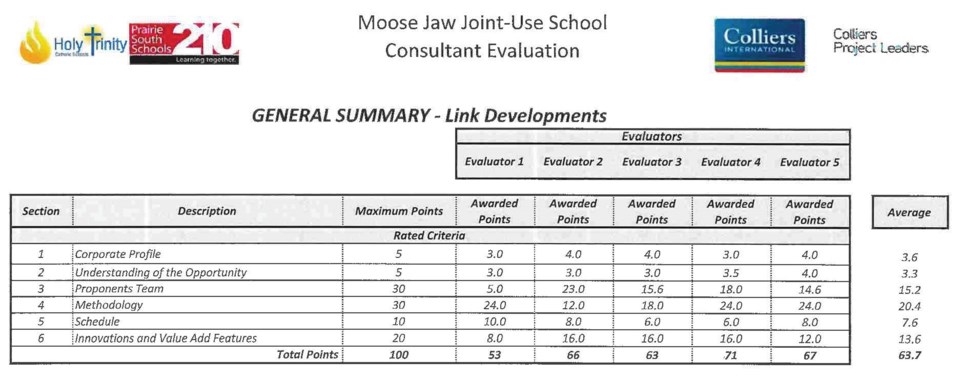City hall and its education partners were forced to pursue a new development option for the joint-use school in Westheath after only one proponent submitted an expression of interest, which eventually led to a memorandum of understanding among the parties, documents show.
“We expected a greater response, but as Mike (Sazynski, vice-president of Colliers Project Leaders) expressed during yesterday’s (May 21, 2020) call, this is a difficult time for this type of request. Please take the appropriate time to review the proposal and consider if this could be a solution to further explore,” Tara Hecker, project manager with Colliers Project Leaders, said in a May 22, 2020 email to members involved in the project.
The reasons for the one submission were a slow market and the coronavirus pandemic’s effects, a separate email said.
The Moose Jaw Express submitted an access to information (AOI) request to city hall asking for all communications between the City of Moose Jaw and both school divisions and the Ministry of Education about the proposed joint-use school on South Hill. This story, along with part 1, part 2 and part 3, are the result of those emails.
Low score
Michelle Sanson, director of planning and development at city hall, told Sazynski in a May 28, 2020 email that her team had completed an evaluation of the expression of interest that Link Developments had submitted.
“There may be some potential, but they scored fairly low. We would need a lot more information before considering them to be a viable developer,” she said. “They do not show much experience, and financial wherewithal is not demonstrated. They are more of an investment company than a developer. Most of their experience is from the advisory team and not the leads.”
According to the evaluation, Link Developments received an average score of 63.7 points out of a possible 100. The lowest score was 53 points and the highest was 71 points.
 A table shows the results of an evaluation that city hall conducted on the one proponent who submitted an expression of interest to develop the Westheath land for the new joint-use school. Photo courtesy City of Moose Jaw
A table shows the results of an evaluation that city hall conducted on the one proponent who submitted an expression of interest to develop the Westheath land for the new joint-use school. Photo courtesy City of Moose JawIn response, on June 2, 2020, Sazynski acknowledged that it was “back to the drawing board” to find a developer. However, “the Boards are (still) clear that this is the only land that would allow them to deliver on their goals of a safe and accessible school,” while pursuing another site would cost the Ministry of Education “considerable money.”
“We are confident the school will be built here and that the City will be compensated appropriately,” he added.
On June 4, 2020, the land development committee met to discuss the issue, with Sazynski providing a summary in the post-meeting minutes. The thoughts about Link Developments were:
- it had limited experience in projects of this size;
- it had no experience delivering public projects;
- it was more of an investment firm than a developer; and
- it had an innovative solution to acquire the land, build the school and develop residential lots.
The committee also agreed there were two options available: issue a new request for proposals for the project or abandon the expression of interest (EOI) and find a new agreement with the city, ministry and school boards.
A new approach
On June 18, 2020, Sazynski emailed Sanson and other education partners to say the project steering committee had chosen to abandon the EOI process and subsequent procurement.
Almost a month later, on July 6, 2020, Rory Jensen with the ministry informed city manager Jim Puffalt that the ministry had created a memorandum of understanding. Furthermore, the ministry and school division officials wanted to present the MOU to city council in July.
“Michelle, I think they may be making the pitch for servicing the 40 lots in exchange for the city allowing this to occur,” Puffalt wrote on July 7.
“Although this sounds interesting, I would think we would want them to specifically spell out their commitment in the MOU,” Sanson replied. “From a business perspective, this may be positive IF that is their clear intent.”
‘Tone’ of MOU troubling
Sanson later recommended in a July 14, 2020 email that the MOU not be signed since there were outstanding issues that needed to be addressed. The “tone of this MOU” was not in residents’ best interests, while she also didn’t think the municipality would receive 35 serviced lots due to the school’s location on the site.
“From a larger perspective, it’ll be the City that gets the complaints for years to come if this area becomes a mess,” Sanson said. “I think it’s important that we frame the bigger picture for Council, instead of trying to estimate revenue generation … there are just too many unknowns at this time.”
Puffalt replied that the ministry would service Wellington Drive at its cost and loop the underground infrastructure pipelines since city hall does not allow leaving dead ends. The ministry would also pay the offsite levies, the city’s sunk costs, and provide serviced lots.
Officials from both Moose Jaw school divisions and the ministry later met with city council during the closed portion of the executive committee meeting on July 27, 2020. These talks likely contributed to the finalization of an MOU that city administration presented during the Sept. 7, 2020, regular council meeting.
Council officially approved the MOU during its regular meeting on Nov. 23, 2020, allowing both school divisions to proceed with the next phase of the project.




